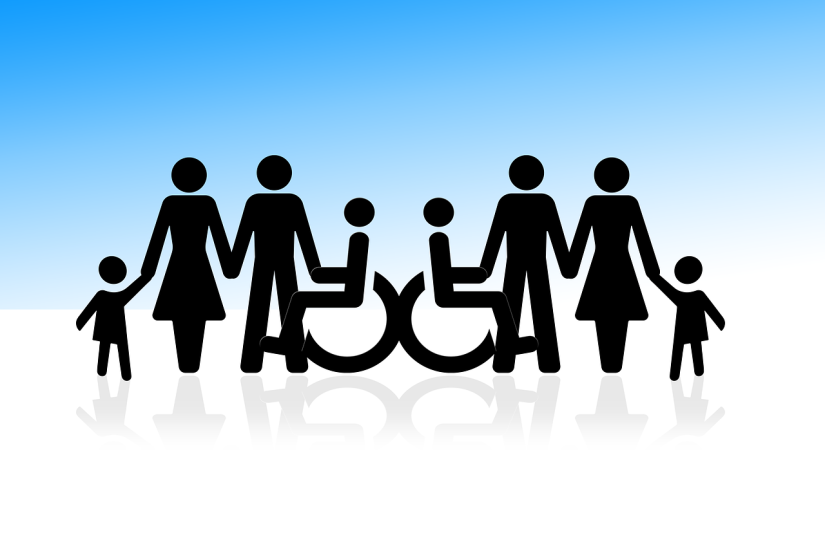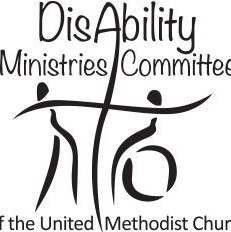Cover image shows multicolored people in silhouette with a person in a wheelchair at the center.
Introduction:
In the past, people have asked us, “Why ae you the Disability Ministries Task Force? Why not the Differently Abled Task Force?” Well meaning questions such as this inspired me to write this article. Language has power. I know that people are often reluctant to use the term “disabled.” I especially see this reluctance in my work in the church. Well meaning people often suggest alternative terms, such as “differently abled,” or “special needs.” However, in the past, erasing the word “Disability” has been used as way to erase us.
In the past, people with disabilities were often institutionalized or hidden away from society, which perpetuated the belief that disability was something to be ashamed of or hidden. But erasing the word “disability” does not erase us as disabled people. We exist, and our lives are of sacred worth. People with disabilities, just like all people, are beloved children of God. By avoiding the word “disability,” we are not addressing the systemic barriers and discrimination that people with disabilities face. We are also denying people with disabilities the opportunity to self-identify and assert their rights and needs.
As a woman who is visually impaired, I am proud to say that disability is not a bad word. Disability has been stigmatized and feared for too long, but the disability community is now reclaiming the word and turning it into a symbol of strength, resilience, and pride. We argue that by embracing the word “disability,” we can use it as a tool for empowerment and change within both the church and society.
Four Reasons Why Disability Is Not a Bad Word:
- 1. Disability is a part of my identity.
My disability is a crucial component of who I am. It influences how I move around the world, the difficulties I encounter, and the answers I develop when I ask theological questions. Living with low vision has helped me become more resilient, tenacious, and adaptable. It has also given me access to a dynamic and encouraging network of disabled friends within the blindness community who share my experiences, challenges, and triumphs. I would be denying a significant aspect of who I am if I denied or concealed my impairment.
- 2. Disability is not a tragedy.
In television shows, books, and movies, having a disability is frequently portrayed as something that is tragic. Characters with disabilities are frequently portrayed as burdens or people to be pitied. Even within our own churches, people with disabilities are frequently viewed as those who are meant to receive charity instead of being empowered to minister to others. This is an incredibly limited and damaging view of disability. For many of us within the disability community, disability is not a tragedy or a curse, it is a different way of being, complete with its own advantages, difficulties, and pleasures. Disability is a normal and varied element of human variety, not a personal shortcoming or a punishment from God.
- 3. Disability is a form of diversity.
Disability is a type of diversity, similar to race, ethnicity, gender, and other identities, that should to be acknowledged and respected. Disability offers opportunities for spiritual development, community building, and social change by challenging the ableist norms and assumptions that now rule society. We can build a more welcoming and inclusive church that honors and respects all of its members by acknowledging disability as a kind of diversity.
- 4. Disability is a spiritual identity and valid way of doing theology.
Disability Theology has made great contributions to the discourse of theology, especially in discussions regarding the question of theodicy. Being aware of our spiritual identity as people with disabilities can strengthen our relationship with God. We frequently cultivate distinctive spiritual practices, viewpoints, and insights that can benefit the Church and inspire others. We can develop a more sympathetic and understanding Church by accepting disability as a spiritual identity.
Closing Thoughts
In the end, disability is not something to be feared or hidden away. It’s a valid aspect of the human experience. As someone with a visual impairment, I’ve learned to embrace my disability and advocate for inclusion and empowerment of people with disabilities within our church and the world; however, I also understand that I do not speak for the entire disability community. Disability is a diverse experience, and we all have different thoughts and opinions.. I understand that some people may still feel uncomfortable using the term “disability,” and I respect that. Everyone deserves the agency to choose the language that best represents their identity and experience.
However, I’m hopeful that the church and society will continue to become more accepting of the viewpoint that disability is not a bad word. By promoting inclusion and acceptance, we can create a more just and compassionate space for everyone to worship and spread the love of Christ together.

About the Author: Rev. Rebecca L. Holland (M.Div.) is a visually impaired, Filipino-American clergywoman ordained as an elder in the United Methodist Church. She is the pastor of two congregations in Central Pennsylvania and serves as the Chair of the Disability Ministries Task Force of the Susquehanna Conference. Her work focuses on the intersection between John Wesley and disability theology. She is the author of Through My Good Eye: A Memoir in Verse, The United Methodist Church and Disability, and Hope for the Broken: Using Writing to Find God’s Grace. She is currently working on project that focuses on interpreting Disability Theology from a Wesleyan perspective.

